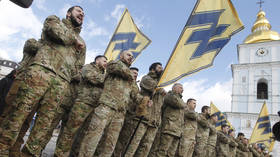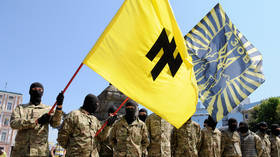US ‘flirting with neo-Nazis’ – Kremlin

Washington will stop at nothing, including the use of neo-Nazis, to damage Russia, Kremlin spokesman Dmitry Peskov said on Tuesday, following a US decision to lift a ban on supplying weapons to Ukraine’s Azov Brigade.
The unit has notoriously welcomed into its ranks people who espouse ultranationalist and neo-Nazi ideologies, and has been described by the Western press as a magnet for such individuals from across the world.
On Monday, the US Department of State cleared the brigade to receive American military assistance, stating that it found no evidence of human rights violations by the group.
“This sudden change of stance by Washington proves that [US officials] would stoop to anything in their attempts to suppress Russia, using the Ukrainian people as a tool. They are even fine with flirting with neo-Nazis,” Peskov told journalists during a media briefing.
Azov was founded as a volunteer battalion of Ukrainian nationalists in 2014 by white supremacist Andrey Biletsky. People who came to power in Kiev following the Western-backed armed coup that year used Azov fighters in an attempt to violently quash a rebellion against the new government in the east. The battalion was incorporated into Ukraine’s National Guard the following year.
In 2018, the US Congress banned the delivery of arms to the Azov Brigade, citing its ties to neo-Nazi ideology.
Since the outbreak of conflict with Russia, Ukrainian officials and Azov members worked to rebrand the unit. Its insignia, which originally paid homage to Nazi symbology, was replaced with less offensive imagery, and its messaging changed to claim that the unit had distanced itself from its roots.
Some former and serving US officials, such as ex-ambassador to Russia Michael McFaul, helped Azov’s efforts by organizing events for them on American soil.
However, Moscow insists that the nature of the unit has not significantly changed. It remains an “ultranationalist armed group,” Peskov stated.













